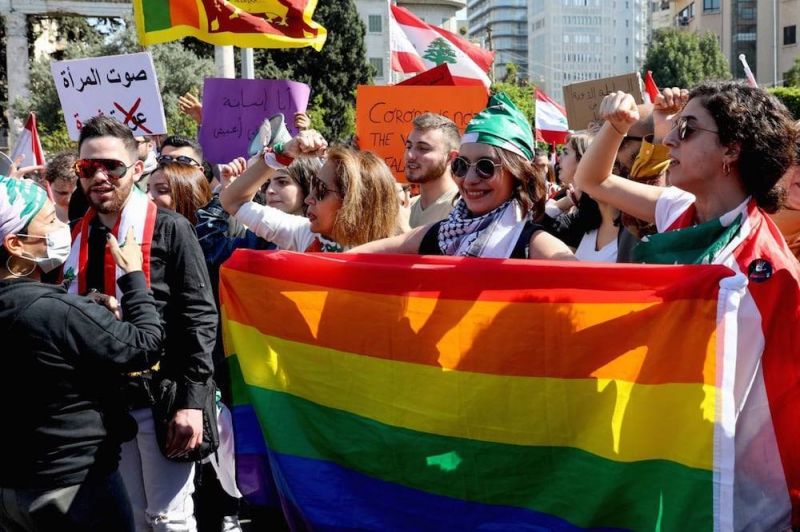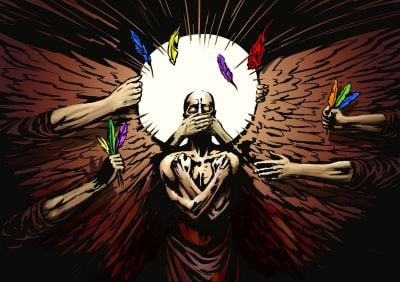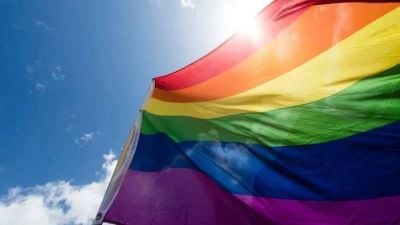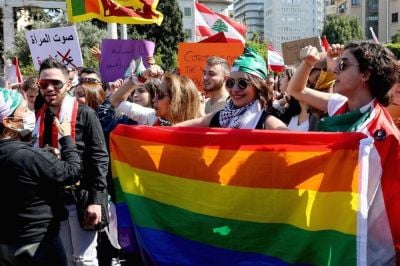
Supporters of Lebanon’s LGBT+ community carry at rainbow flag at a march on International Women’s Day 2020. (Credit: Anwar Amro/AFP)
BEIRUT — In late 2022, Samir* was walking in a popular cruising spot frequented by gay men in Beirut, when a man driving a car approached him.
“He was giving me some looks” that could be described as flirty, explains Samir, who hopped in the vehicle. They began flirting: “It felt like any other hook-up,” says Samir. After questions were exchanged about sexual preferences, the man asked him if he used drugs, to which Samir said no.
“Suddenly, the man showed me his ID saying he's 'from the army' and asking if my parents have a lawyer,” continues Samir, who then started to feel afraid.
Although not explicitly illegal in Lebanon, Article 534 of the penal code is used to criminalize homosexuality; this could have meant at least pre-trial detention for the young man.
The man then told Samir: “We can resolve the issue in another way.” Samir suspects that this was the cue for him to pay a bribe to get out of trouble.
But Samir quickly managed to jump out of the vehicle as soon as the man pulled over. He narrowly escaped, but the man allegedly followed Samir to his car and tried, unsuccessfully, to block him.
In the past few days, many people on social media have sounded the alarm over what they call extortion attempts by rogue members of the security forces who, whether online or in person, are allegedly trying to extort money from LGBTQ+ individuals.
A security source, who spoke on condition of anonymity because he is not authorized to talk to the press, told L'Orient Today that the ISF was following the issues raised over social media, but added that so far they have no information on it.
Ghassan* says a similar incident happened to him recently in Beirut. He and his friend were sitting in his car when all of a sudden a white SUV approached them. “I knew it was a cop car, it had the number and the license plate,” explains Ghassan.
He says the men approached them and started yelling “You’re lesbians, what are you doing here?”
They began searching his car, ostensibly for drugs. Stressed by the situation, Ghassan began yelling that there was nothing there.
“They were shouting 'Where are the drugs?'” he says. They searched his trunk. He says when the men tried to handcuff him, he fought back, saying: “Don't touch me. I didn't do anything wrong.”
In an effort to get rid of the cops, his friend started to say that they don't support homosexuality.
He says the cops then started threatening to put them in jail: “Clearly they were just trying to stress us out and it worked,” explains Ghassan. The cops then asked them for their IDs; as Ghassan was pulling out his wallet, the cop snatched it, took the money that was in it and gave the wallet back to Ghassan. They did the same to his friend.
“It's not about the money. It's about the idea that if you're a person in power, don't abuse your power,” says Ghassan.
Impersonations on Grindr?
Such incidents come amid increased warnings circulating on social media about safety for LGBTQ+ people.
A post circulating on social media on Monday night warned Grindr users that police officers were making fake Grindr accounts with the intent to entrap LGBTQ+ folks, arrest or even extort them.
Grindr is a popular geo-based dating app commonly used by gay individuals to meet people. Lebanese authorities blocked the app in 2019 though it is accessible via VPN, and the app includes a safety warning for users in Lebanon to verify that others they meet through the platform are real.
The post, apparently originating from a private account, made rounds on Instagram and Twitter carrying this warning: “The police are posing as gay men and entrapping people all the way from Ramlet Al Bayda to Marina Dbayeh,” which, the post added, was being done to arrest LGBTQ+ individuals or extort them for “thousands of dollars.”
A really grim warning being shared widely on Instagram by members of the LGBTQ community in Lebanon with the community and others being targeted by the police in Beirut, posing as gay men to entrap, arrest and extort.
— Joseph Willits (@josephwillits) January 9, 2023
Reports too of them using apps such as Grindr. #LGBTQ pic.twitter.com/CxoinL6qht
But it is not proven or clear that the ISF is actively behind these extortion cases.
According to Tarik Zaidan from LGBTQ+ advocacy group Helem, “It seems like there is no decision or statement from the ISF to target LGBTQ people specifically.”
Helem was able to track down the viral post and after investigating found that “it came from one incident where someone on Grindr suspected a person and basically blocked them and not because there was an actual shakeup.”
He continued: “Apparently, there are some members from the police force illegally targeting people, whether through drugs or whatever to extort money. And this is different from saying there's a security movement to engage or attack and isolate LGBTQ individuals. But we will look into making sure this is the case in those two days.”
The security source insisted that the ISF does not issue directives to impersonate gay people on Grindr, saying that in the past week, they moved to arrest a man who was extorting gay people: “We arrested a person who was ambushing them over social media and then stealing from them.”
He added: “But it can be that someone is pretending to be a policeman … I urge people to call 112 and report what happened to them; people should be more aware of their rights in this country.”
A continuous crackdown on the LGBTQ+ community
In the past year, repression of Lebanon's LGBTQ+ community has resurfaced as both government and religious officials have called on a crackdown.
In June of last year, during pride month, caretaker Interior Minister Bassam Mawlawi issued a decree instructing security services to shut down any LGBTQ+ events during the month, leading to a coalition of rights groups condemning the move. The State Shura Council later overruled his decision, but that didn't stop him from issuing a similar decree in Nov. 2022.
And in Aug. 2022, Hezbollah Secretary General Hassan Nasrallah said in a speech that homosexuality was “opposed to nature” and the “call to homosexuality” is being directed by the US, adding: “We need to prevent them from becoming gay because it is hard to cure them afterwards.”
In the meantime, Helem says it is investigating the issue. “In the next couple of days, if more stories emerge about police targeting queer people, that would be a much bigger issue, an issue of the complete collapse of the security system in Lebanon and that police have become criminals, which is not new but means there is an anarchy in the police,” Zaidan said.
*Names have been changed to protect the safety of the people mentioned.


